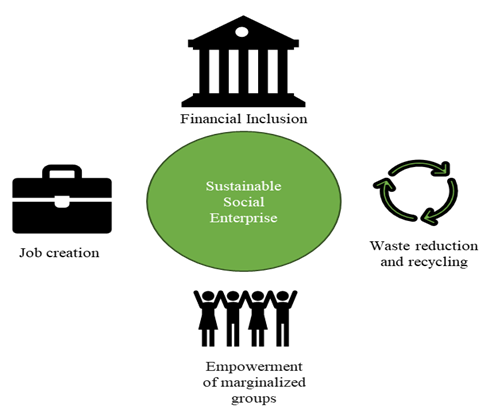Research Article | Open Access
|
Open Access
|


 | Published Online: 29 September 2025
Sustainable Social Enterprises in Post-Conflict Communities: Pathways to
Resilience, Recovery, and Inclusive Development
| Published Online: 29 September 2025
Sustainable Social Enterprises in Post-Conflict Communities: Pathways to
Resilience, Recovery, and Inclusive Development
Yusuf Sagir,1 Adamu Tijjani Yahaya2 and Abdullahi Usman Kofar Naisa3,*
1 Department of Social Work, Kalinga University, Raipur, Chhattisgarh 492101, India
2 Department of Social Development, Kano State Polytechnic, Kano, 700282, Nigeria
3 Department of Sociology, Bayero University, Kano, 700006, Nigeria
*Email: aukofarnaisa.mambayya@buk.edu.ng (A. K. Naisa)
J. Collect. Sci. Sustain., 2025, 1(2), 25409 https://doi.org/10.64189/css.25409
Received: 18 July 2025; Revised: 13 September 2025; Accepted: 24 September 2025
Abstract
Post-conflict communities face multidimensional challenges including disrupted economies, weakened governance systems, and eroded social cohesion. While humanitarian aid provides immediate relief, it often fails to generate long-term sustainability. Social enterprises-organizations that integrate social and environmental objectives into profit-making activities-offer a promising model for inclusive recovery. This study critically examines the role of sustainable social enterprises in post-conflict communities, focusing on their economic, social, and ecological contributions. Using a qualitative desk review and global case studies (Rwanda, Sierra Leone, Bosnia), the study proposes a framework for integrating sustainability into enterprise models. Findings reveal that social enterprises foster resilience, empower marginalized groups, and contribute to peacebuilding, though challenges remain in access to finance, governance, and capacity building. This study concludes by recommending policy reforms, multi-stakeholder partnerships, and social work engagement to strengthen sustainable enterprise development in fragile contexts.
Graphical Abstract
Novelty statement
The role of sustainable social enterprises in post-conflict communities focusing on their economic, social, and ecological contributions.






